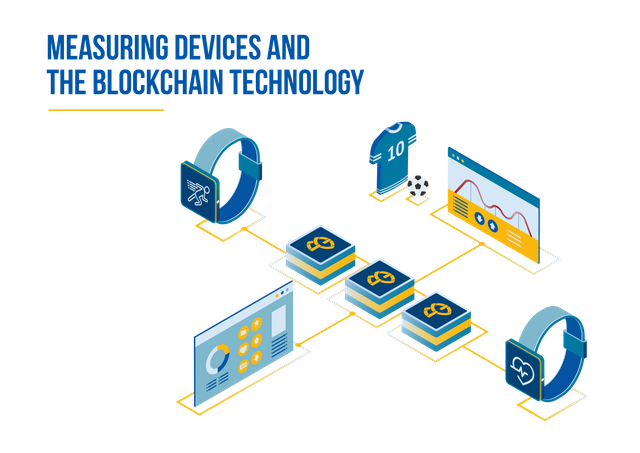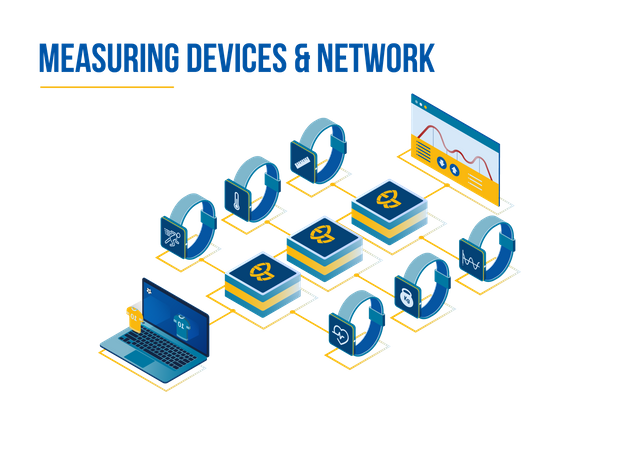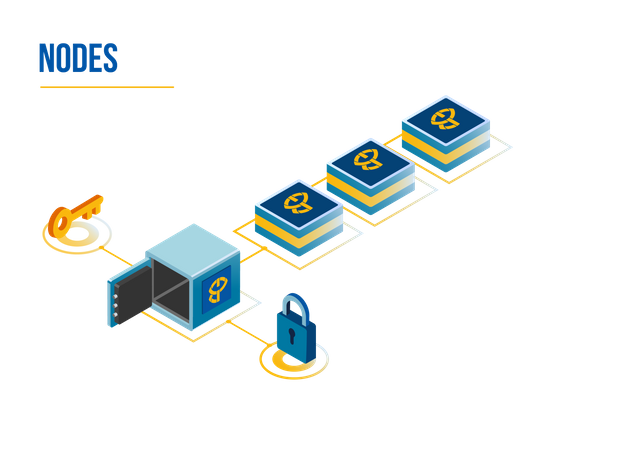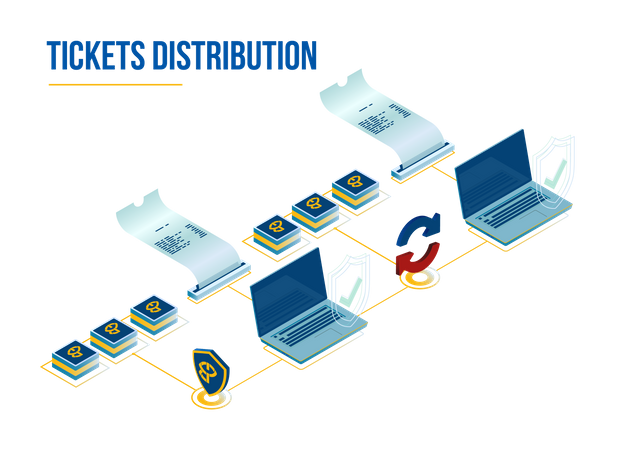Introducing PlayMaker Chain - A Blockchain and IoT-Based Solution for Sports Business
Our first post on Steemit will be used to introduce all you blockchain and cryptocurrency lovers to the PlayMaker project and its benefits. So, without any more blah-blah, let's go...
%201.0.2.png)
https://playmakerchain.com/
By incorporating modern training measuring devices with the irreversibility and immutability of the blockchain technology, PlayMaker is creating the ultimate business-focused ecosystem for sports.
Maybe this sounds more complicated than it actually is? This is how we'll do it...
The Basics
Professional athletes train wearing special sensors which send the recorded training data directly to the decentralized storage in real-time. That data can be reached seamlessly by entities holding secret keys.
Data recorded in this irreversible way is completely trustworthy and thus, can be used for more purposes than it was possible with traditional centralized servers. Simply put, PlayMaker is introducing the sports science with the blockchain technology, producing a polyvalent database ecosystem in the process.

If we can take an example, say that Juventus wants to buy Luka Modrić next summer. Since Luka is already 33 years old, they want to have a detailed and trustworthy overview of his physical condition before they make a multi-million|acquisition.
Real Madrid provides the access to all his training data stored on the blockchain which is secured with a private key, and, according to it, Juventus are able to make a more educated decision about the acquisition. Juventus would be able to completely trust the data presented to them as it is a known fact that data which is stored on the blockchain can’t be changed. And since it is stored in real time by the machines themselves, all “fine-tuning” of human origin is out of the equation.
"A bit" of technology
PlayMaker is a project based on the blockchain technology forked off the VechainThor ledger. Its intention is to tweak and utilize Thor’s technology to present solutions for some notable problems in the world of sports. From the use of the training data harvested through the IoT devices and AI, all the way to the revolutionary ticketing system.
Since this undertaking demands some improvements in the technology, instead of the approximately 10,000 transactions per second on the Thor network, the PlayMaker blockchain will handle up to 15,000 transactions per second.

However, the vision behind PlayMaker is to be complementary to VechainThor – not to compete.
While Vechain is used mainly for supply chains in various industries, PlayMaker will be dedicated to all sports-related businesses, providing sports institutions with more transparency and business options. Therefore, PlayMaker has been made simple and tech-wise similar to VechainThor so that the system could gel with Thor’s bug fixes inside the minimal timeframe.
In short, rather than concentrating on “whose technology is fundamentally better or faster?” race, we are experiencing in the blockchain industry nowadays, PlayMaker is committed to building a trustworthy decentralized business solution with transparent information flow, collaboration, effectiveness, and high-speed throughput.
The back end of the PlayMaker system consists of:
- Blockchain as a service
- Internet of trusted things
- Proof-of-Authority consensus reaching mechanism
The front end is established in 3 simple steps
- Install PlayMaker
- Run the network
- Proxy to the network
- Client to PlayMaker
The system with two cryptocurrencies
PlayMaker (PMK)
The main utility token on the PlayMaker network used to run authority nodes and smart payments on the network. Sold during the funding campaign.
PowerPlay (PWP)
Token generated by the network for authority node rewards. used for executing smart contracts, writing data to the blockchain, and PMK transaction payments.
PlayMaker nodes
Masternodes are elite representatives of their users on the network. In every other consensus reaching mechanism other than Proof-of-Work, nodes carry the load of the security of the entire ecosystem and are rewarded for doing so. In the Proof-of-Authority system, nodes are allocated to those that are fit to carry that burden and, therefore, eligible to harvest rewards derived from the network traffic.

Therefore, PlayMaker users will also be able to run nodes on the network. Depending on the type of user, there will be more than a few options available, and every one of those with its special benefits.
Not every PlayMaker node is reserved for the institutional elite, and all users are able to acquire and maintain the node according to their standard. Those are:
Authority nodes
Authority nodes are used to validate all transactions on the PlayMaker blockchain. Although the requirements to run them are the highest, their owners will get the highest rewards. There will only be 101 authority nodes. The minimal amount of PMK to apply for one is 200.000.000. Authority nodes are selected and rated by PlayMaker and require a full KYC and application procedure. They need dedicated hardware for blockchain validation and their owners receive the highest PWP production rate along with some voting rights.
Economy nodes
The economic nodes are not validating blockchain transactions, but offer stability to the ecosystem and also generate PWP income for their owners. No hardware is required, users only have to place their PMK into the PlayMaker wallet. The minimum of 400.000 PMK is required to set up the smallest node.
Bonus - The ticketing system
PlayMaker App allows all fans to buy tickets online using PlayMaker’s system, which cuts down costs of ticket printing, distribution, and accounting so critically that organizations will be able to lower the prices while providing fans with the much better user experience.

Fans buy tickets for their favorite team’s matches in PlayMaker (PMK) cryptocurrency or fiat currency accepted by the organization. In the meantime, they are able to vote in club-issued polls, like “Which jersey would you choose for the upcoming season?” or “Who was our MVP last season?” The more tickets a fan buys, the more power his/her vote holds.
This deepens the connection between clubs and fans and provides an extra level of influence a fan can have on the club’s decisions.
Tickets re-selling is an illegal act, and through the usage of the PlayMaker’s ticketing system, tickets black market is completely eliminated, and counterfeiting made impossible. This also benefits both, clubs and their fans, since there will be no more ridiculously inflated prices of tickets, and various problems concerning counterfeiting will be neutralized.
Moreover, institutions (clubs, promotions, etc.) are now able to prevent identified troublemakers (hooligans) to attend venues, making stadiums safer for true fans and their young ones, while also potentially cutting costs of expensive stadium security.
PlayMaker's market
It is widely known that sports are a huge and lucrative worldwide business and the disrupting blockchain technology is yet to penetrate this multi-billion industry.
Ones of the richest organizations in sports are football (soccer) clubs, whose yearly revenue exceeds €760 million.
FIFA World Cup is the biggest event in sports today, and its 2018 edition generated a gigantic revenue for the organizers as well as for the football associations. Broadcast revenue topped $2.43 billion, while sponsorships and ticket sales brought in $1.6 billion and $527 million, respectively.

Looking beside football, we can take the example of the NBA champions, Golden State Warriors, whose yearly revenue tops $350 million.
Furthermore, organizations promoting events for individual sports do not fall far behind, such as the famous MMA promotion organization UFC, which generated a revenue of over $700 million in 2017.
PlayMaker development team considers each of these organizations (and many similar ones) to be our potential client or a partner, as our product is the first one which deals with some notable problems these businesses are encountering on a day to day basis.
If you have come this far reading...
That means that our project really caught your attention, and we definitely want to thank you for that. Since that is the case, you might want to join our community:
Looks promising, although a couple of questions come instantly to mind.
Before anything else though, since you came to post here, I'm curious whether you did a comparative analysis of building on VechainThor versus building on Steem instead ?
I confess that, despite the fact that I bought quite a bunch of VET tokens, I don't know much about VeChain Thor. Went to github and read that is "compatible with the ethereum ecosystem" which to me counts as a negative.
Haven't seen much in terms of dApps built for VeChain aside from a wallet, which is not a good sign either
Do VeChain transactions have fees ? If yes, that's a BIG issue as it seriously impacts usability
I don't quite see in the use case you detail why you'd need "trustless computation" (i.e. "ethereum-style smart contracts").
Anyway, have a look at steem, we have built https://eftg.eu from a steem fork in record time, see details here
As you can read in the above post, we were helped a lot by the steem community. Does VeChainThor have a similarly helpful community of developers with aligned interests ?
Hey, Sorin!
Sorry for a delayed reply.
Here is how things stand on our side...
Our choice to go with a fork of VeChain instead of Steem is largely due to the inbuilt IoT capabilities. IoT was the biggest factor as ours is an IoT heavy solution.
Regarding the "ethereum ecosystem compatibility," we will be deploying different smart contracts that will facilitate various functions of the network. Until we've established a PlayMaker smart contract framework the Ethereum compatibility will be a great compliment.
VeChain has launched several dApps the most common being the OceanX Decentralized Exchange. You'd have to do more research on that if its something you'd like to know more. We've also found the VeChain as helpful, I agree it would have been a challenge if they weren't.
Thanks for the Steem suggestion - perhaps we'll look into it to find solutions we could incorporate into PlayMaker.
In the meantime, since you have given us good feedback regarding what we should explain more thoroughly, we have composed an article about why we have chosen VeChain. You can read it here: https://steemit.com/blockchain/@playmakerchain/why-is-playmaker-building-on-vechain-architecture
Cheers! ;-)
Congratulations @playmakerchain! You have completed the following achievement on the Steem blockchain and have been rewarded with new badge(s) :
You can view your badges on your Steem Board and compare to others on the Steem Ranking
If you no longer want to receive notifications, reply to this comment with the word
STOPVote for @Steemitboard as a witness to get one more award and increased upvotes!